Eden McCallum – Business Outlook Survey Findings
Business leaders are confronted with a troubling backdrop this October: war in Europe, energy price rises, supply chain uncertainty, and an inflationary outlook. It is no surprise, then, that the latest Eden McCallum survey of business sentiment has revealed some disquieting responses.
The firm asked about 300 business leaders in the UK, Netherlands and around the world how they are facing up to the task of managing through the current difficulties. It is clear that senior leaders are very concerned about the immediate future as they try to steer a path to better times.
Pessimism about the global economic outlook has risen to the highest levels seen for some time. Around 85% of business leaders in the UK and the Netherlands are pessimistic, with lower levels of gloom registered elsewhere in Europe and in the US.
The UK is gloomiest of all, with 96% pessimistic about the domestic economy over the next couple of years, an even higher figure than was seen after the Brexit vote in 2016. 64% of Dutch business leaders are pessimistic, also an unprecedented level in recent times.
The encouraging paradox is that, individually, business leaders are more hopeful about the prospects for their own company. Over half are optimistic about their company’s performance over the next 1-2 years. In North America that figure rises to 70%.
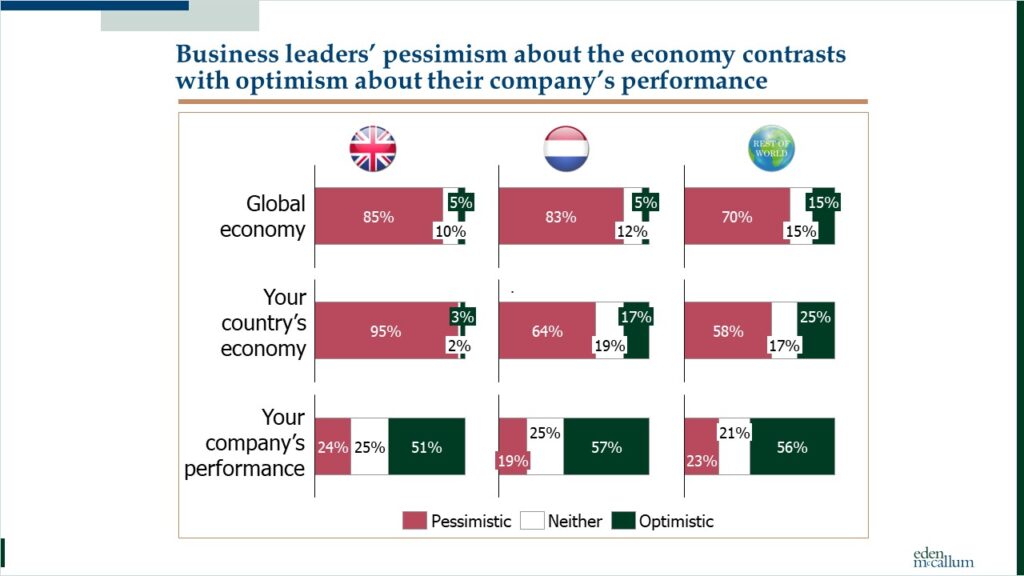
The challenges
The causes of the generalised concern are clear from the survey data: asked about the top three threats to the global economy, geopolitical instability is cited by 73% of business leaders, while inflation is mentioned by 53%. In terms of threats to their company’s performance, inflation is also mentioned by 49%, while labour shortages (36%) and a change in customer demand (34%) are also a matter of concern.
Internally, talent acquisition and retention is the biggest issue for business leaders (48%), while digital transformation (29%) and pricing (22%) are the next priorities.
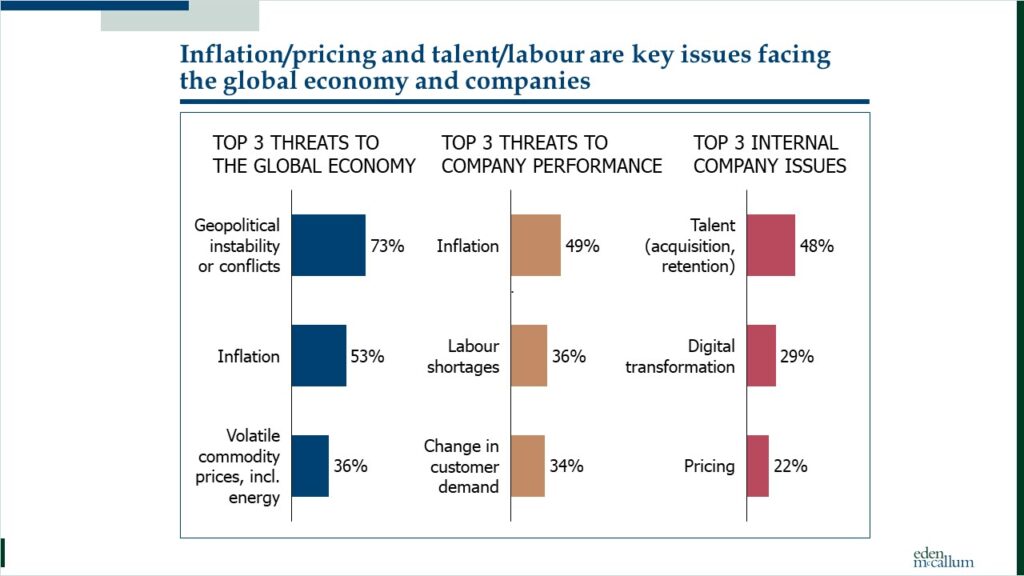
Inflation has become an inescapable challenge in recent times. Over half of the respondents to the survey (52%) said that input price inflation has had a significant impact on their cost base, while another 33% say there has been some impact.
Absorbing these cost rises presents a different challenge depending on which sector businesses are operating in. Overall, almost 70% of businesses have been able to pass some of these cost rises on to customers. This has been easier for B2B businesses (80% have managed this) than for B2C ones (only 63%). This perhaps helps to explain the higher levels of optimism found among B2B business leaders (63%) than among B2C ones (47%).
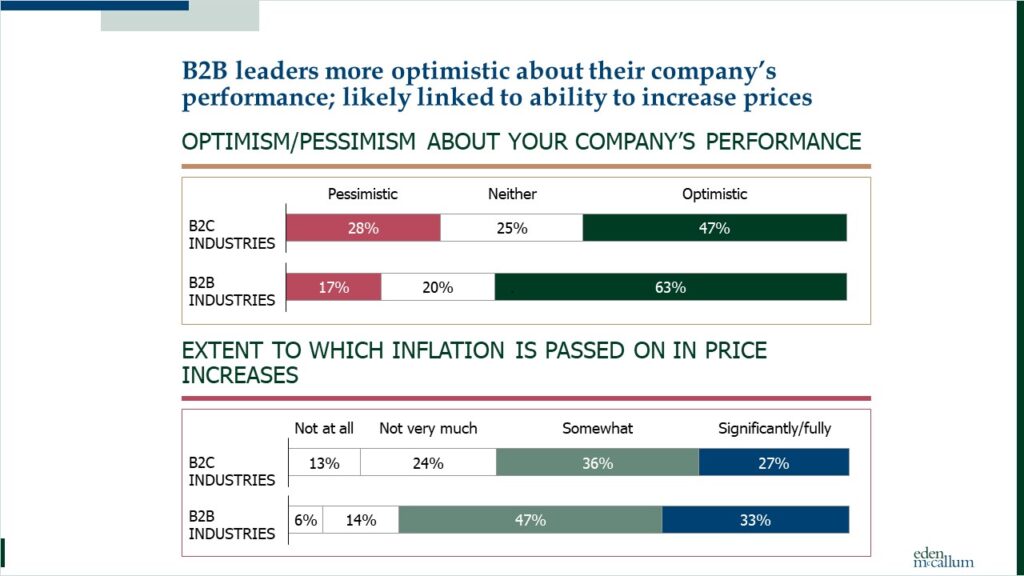
The need for talent
Half of business leaders say talent attraction/retention is a top issue for them, while 4 in 10 say that talent attrition levels are higher now than they were before the Covid-19 pandemic. This isn’t surprising: in our consumer survey on Ways of Working, three-quarters of respondents said they expect to change their role in the next 6-12 months. Business leaders are making a range of interventions to try to attract and retain that talent. More flexible working is being offered by 63% of businesses; creating a more supportive company culture is being undertaken by 55%. Half of the leaders surveyed have communicated more about purpose, while 42% have offered more training and development opportunities, and 41% have increased pay. In the wake of the pandemic, attrition seems to be a bigger issue for larger companies than for small ones.
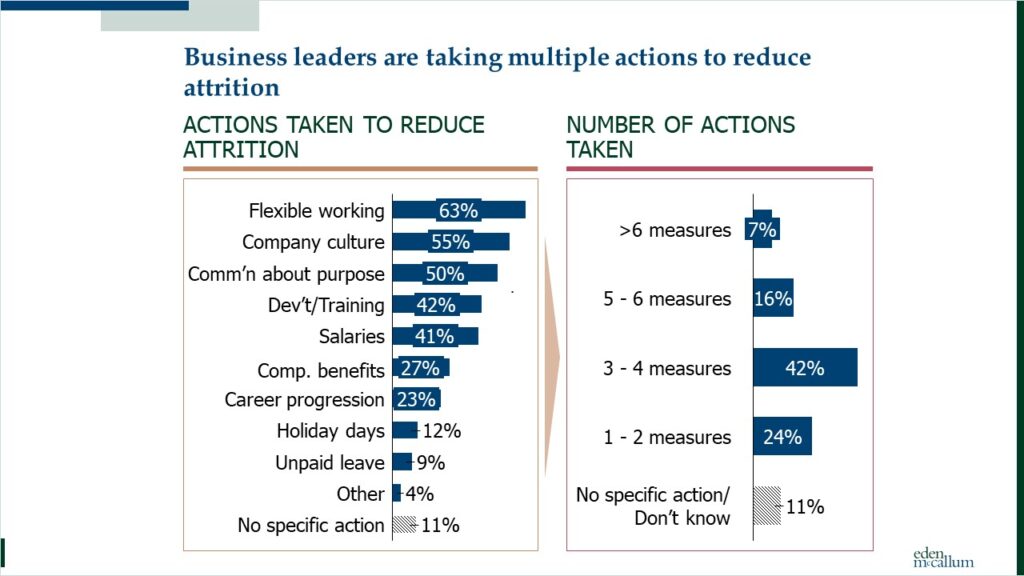
New ways of working
New working practices as the pandemic comes to an end has also been an issue for business leaders. 71% of organisations have adopted a hybrid model of home and office days, while 21% offer a fully flexible approach.
The tension perhaps still to be resolved is employee vs employer preferences. In our consumer survey on Ways of Working, three-quarters of office workers said that flexibility to work from home is an important consideration when choosing their next role. A similar share of business leaders (74%) believe it is important that employees are in the office regularly. This, they believe, will help team cohesion (47% cite this factor) and support company culture and values (21%).
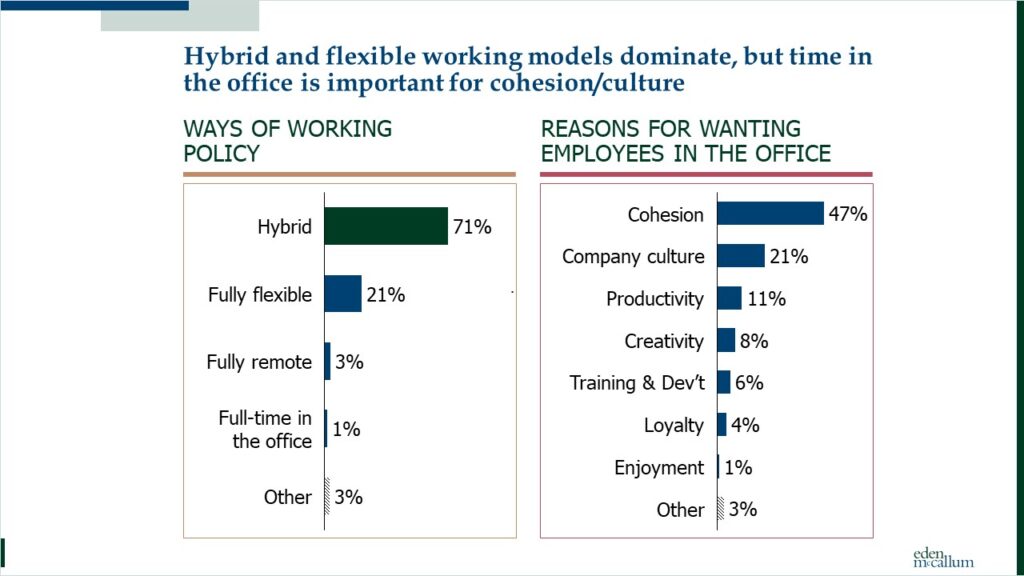
Dena McCallum, co-founder of Eden McCallum, says it is not surprising if some business leaders are looking warily towards the next year or two of trading. “Uncertainty about future inflation, customer demand and political instability is bound to give business leaders pause for thought right now, as margins are squeezed and growth slows,” she says. “And it is understandable that companies are focused on attracting and retaining talent. Businesses will have to perform well in the testing times to come, and they will need the talent to do that. The Covid pandemic created new workplace norms and expectations, and both business leaders and employees are still working out where the pendulum will settle. The anticipated recession is putting more uncertainty into that question.”
To view the full results, please click here.
Follow us on LinkedIn to remain updated.

